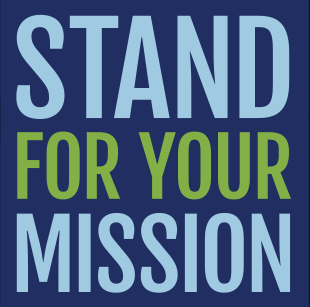|
Image

Now a national model, formally engaging board members in public policy advocacy was spearheaded by Sonya Campion and the Housing Alliance right here in Washington. Now, many nonprofit boards in our state endorse public policy positions, meet with lawmakers, and attend events like Housing and Homelessness Advocacy Day. Our local efforts are changing the culture of boardrooms in our communities. Board Source is making board advocacy a best practice across the nonprofit sector and across the country. |
Do you serve on a nonprofit board? Take the pledge to Stand For Your Mission!
Why Should You and Your Board Advocate?
Together, we can ensure everyone in Washington has the opportunity to live in a safe, healthy, affordable home.
There are over 10,000 board members of affordable housing and homelessness nonprofits in our state. Nonprofit board members can - and must - play a pivotal role in the movement to end homelessness.
Advocacy furthers the mission of your organization.
Public policy directly impacts your organization's ability to do its work and very directly impacts the lives of your clients. Goals like creating affordable homes and ending homelessness are only achieved when organizations and government policies are aligned to work together.
Policymakers need your input.
As a someone who is an integral part of the governance of a nonprofit working in the community, you have the best understanding of how policy decisions are impacting your clients and organization. If you don't share that information with legislators and policymakers, who else can?
Public funding is critical to your organization.
If your board works on raising funds from private donors but isn't paying attention to the portion of your organization's budget that comes from the government, then they are missing funding sources that can make or break whole programs and service areas.
Advocacy helps strengthen the relationship between board members and the organization's work.
Advocacy is an opportunity to fully engage a board in sustaining the work - and meeting the mission - of the nonprofit they serve.
How To Get Started
It's easy...start advocating!
It can be as simple as responding to an action alert or forwarding an email to people in your network. The most important thing is to start taking action.
Stand For Your Mission starts with capacity-building tools for integrating advocacy into your organization. Then we connect this with the most important legislative issues impacting our state today. Whether you're an individual board member looking to get involved in advocacy by yourself, the chair of an advocacy committee working to maximize your organization's impact, or an executive director trying to determine best practices for your organization's board, the Stand For Your Mission is here to help.
Start by taking the Pledge to Stand For Your Mission. Taking this pledge will get you on the list for a regular email from the Housing Alliance that will connect you to the advocacy movement. We'll provide you with tips on how to strengthen the power of your board's advocacy efforts and real-life examples of organizations in Washington that have successfully integrated advocacy into their board work and how they accomplished it.
Check out these articles to discover how our work in Washington state has become a model for a nation-wide rollout of board advocacy
Why board engagement in advocacy is essential
Make advocacy a part of every board members duty
Advocacy: An essential board responsibility
Tell Board Source about your advocacy work
Stand For Your Mission pushes board advocacy
For more information about anything related to Stand For Your Mission, please contact Member Organizer, Dimitri Groce at dimitrig(at)wliha(.)org.
When emailing, please change "at" to "@" and delete the parentheses. This helps us prevent spam.

